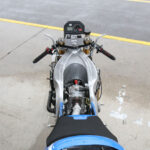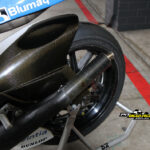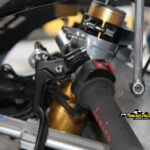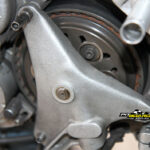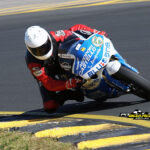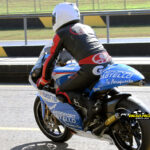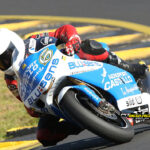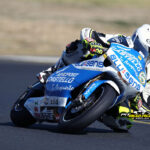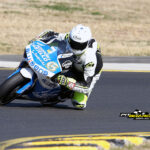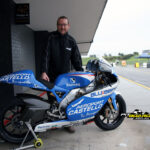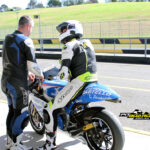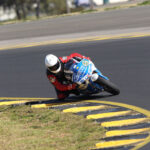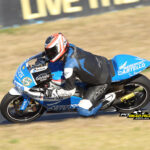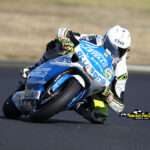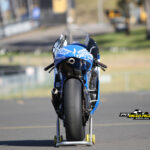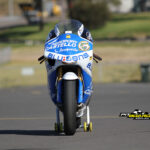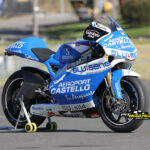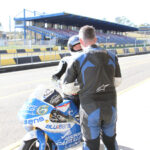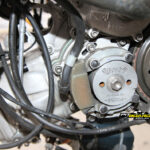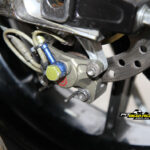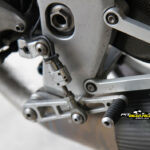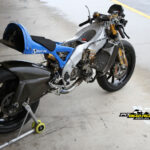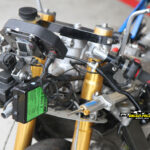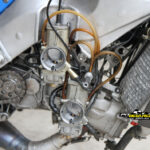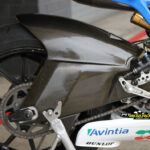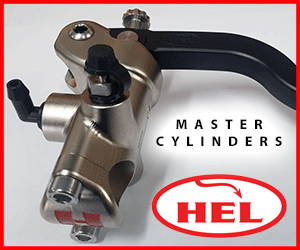The chance to ride a real deal 250 Grand Prix World Championship bike is the stuff dreams are made of. I grew up obsessed by 250GP racing. In my teens in the 1990s I knew every rider, every race number, had the posters on my bedroom wall and all of the races taped on videotape!
As soon as I got my Learners, I was on the road on an old RZ250FN, followed by a few TZR250s before I started road racing on RGV250s in 1995. Even my RGV racebike was painted the same colors as the Ralf Waldman HB 250. Riding the RGV proddie, I dreamed of one day being a 250 GP rider…
Check out all of our racer tests here…
Fast forward 22 years and I find myself about to ride a RSW250 Aprilia thanks to the owner, Harry, who kindly offered us a spin. Things have changed with my 250 GP aspirations, though, not only am I over 40, I also weigh more than the bike! Now that is funny! No lap records, then. At least that is my excuse…
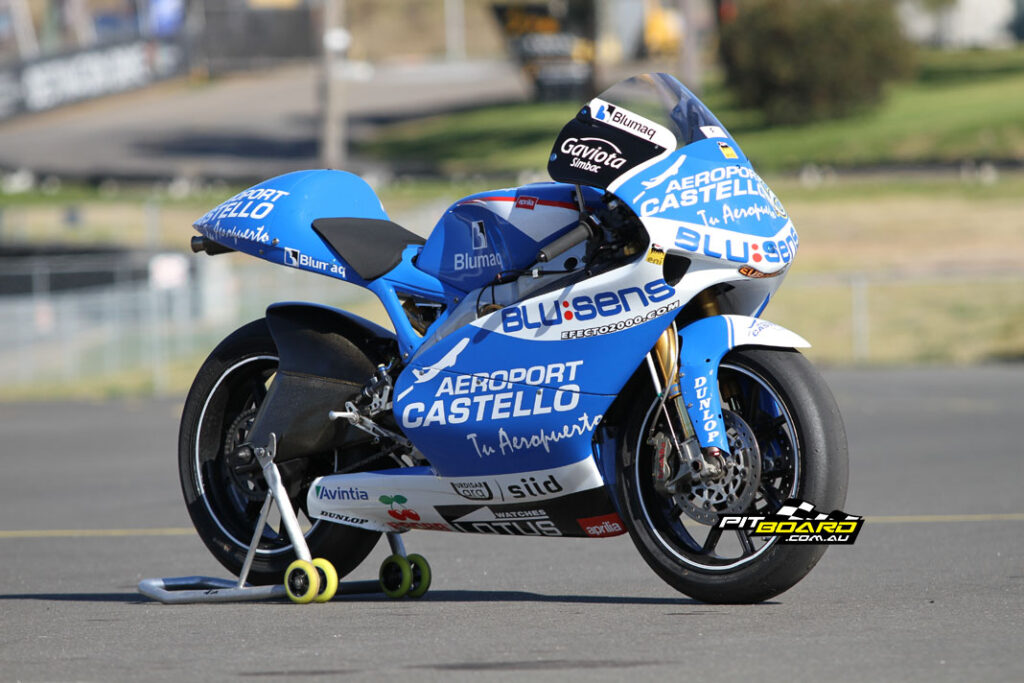
About the bike. It is trick. It is expensive. It is rare and absolutely stunning. The peak of two-stroke development is right here under the fairings… This is the Aprilia Racing RSW250 ridden by Eugene Laverty in the 2008 250 Grand Prix World Championship. It is the real deal and very, very rare, not to mention priceless. The swingarm alone is worth are fifty grand!
The RSW250 was made by Aprilia from 1991 to 2007. It has been ridden to world titles by the likes of Max Biaggi, Valentino Rossi, Marco Melandri, and Jorge Lorenzo and has won countless memorable races. With just over 100-horsepower at the wheel and weighing in at less than 200-pounds the power-to-weight is over one to one.
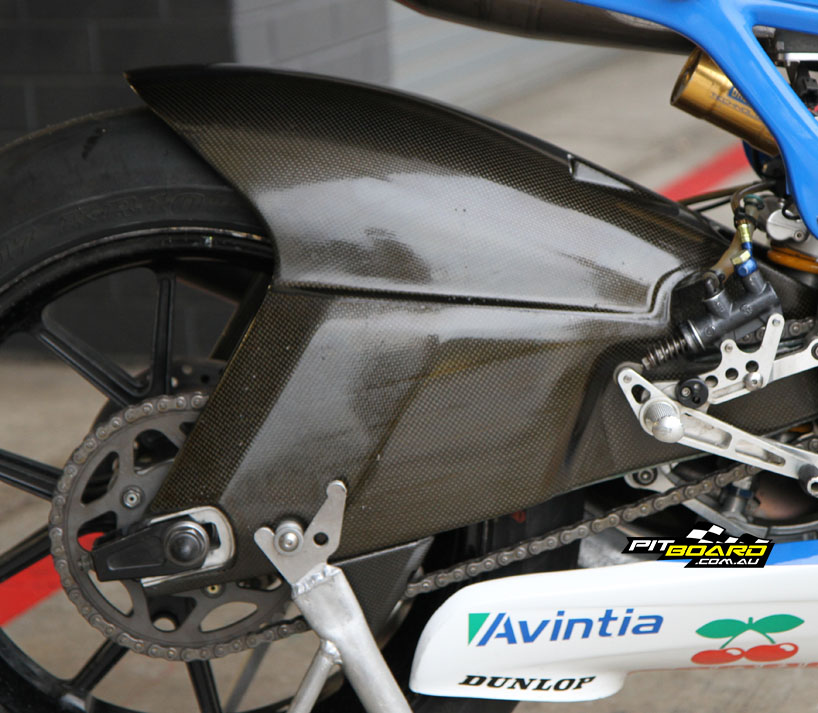
The frame is hand made aluminum, as is the fuel tank. The seat unit and rear hump is a complete A kit part only for factory teams, all carbon-fibre monocoque, and the wheels and swingarm are carbon-fibre also. The engine is cast magnesium and every single nut, bolt, axle and washer is titanium. The massive ram air system and airbox is also carbon-fiber, as is all of the bodywork. It truly is a work of art and at this level of racing, you can see where a million bucks goes…
The 249cc 90-degree V-twin two-stroke revs to over 12,000rpm and is the absolute trickest little engine I’ve seen. The opportunity to actually get in there and have a good look was heaven, as these bikes were always so guarded when they were competing of course.
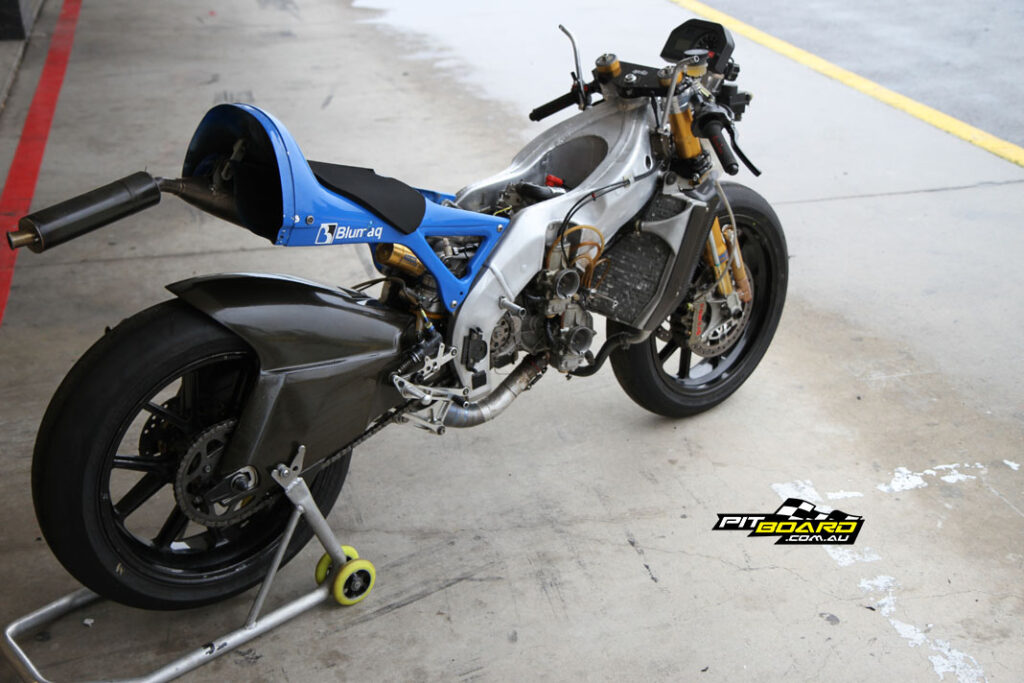
What is immediately apparent is the size of the engine compared to a production 250 two-stroke. There is nothing there that is not needed and everything has been developed and refined to be absolutely as compact and lightweight as possible.
The clutch is tiny, as is the gearbox and cases. The other side has the small magneto flywheel and ignition pickup. The expansion chambers are gorgeous – titanium with carbon-fiber mufflers, and the airbox and carburetors are so, so mind blowingly trick. Just look at those pictures and drool!
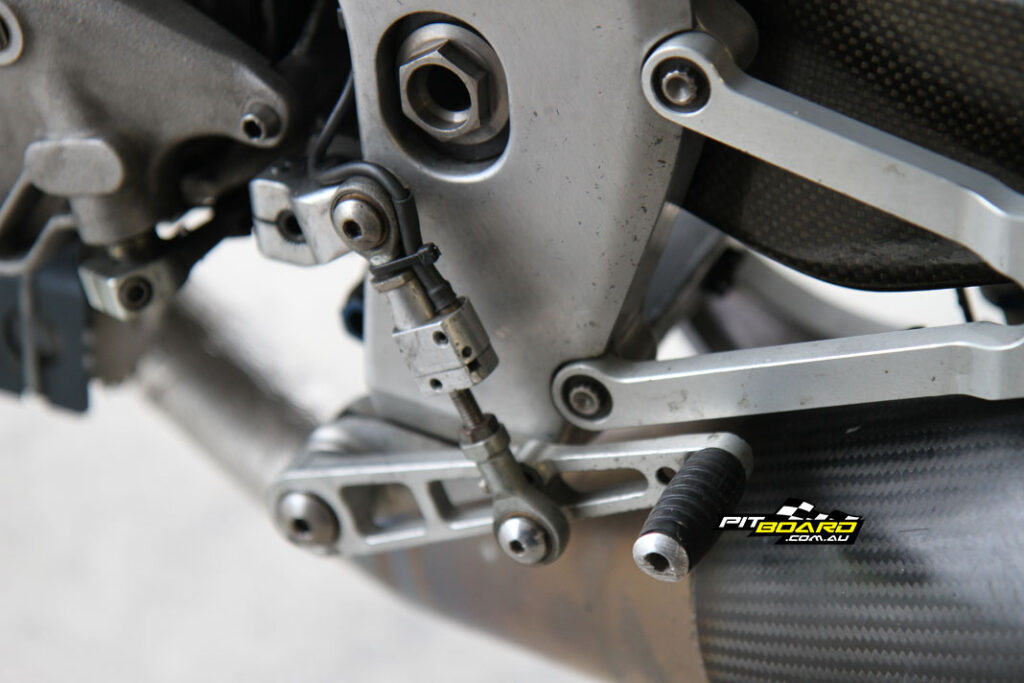
The wheels are factory items that simply cannot be bought. Ever. Brakes are factory spec monobloc radial-mount calipers with cast-iron rotors. Carbon-fiber is available for some situations also. Ohlins factory suspension is at both ends. Rumor has it the forks are worth 20 grand each. The triple-clamps are titanium and the handlebars carbon-fiber. Everything is tiny, compact, almost under-engineered.
What may seem like a simple two-stroke is far from it. Aside from the technology in the tuning of the porting, combustion chamber, crankcases and expansion chambers, there is a complex fueling and powervalve system along with full data logging and even traction control. Yes, you read that right.
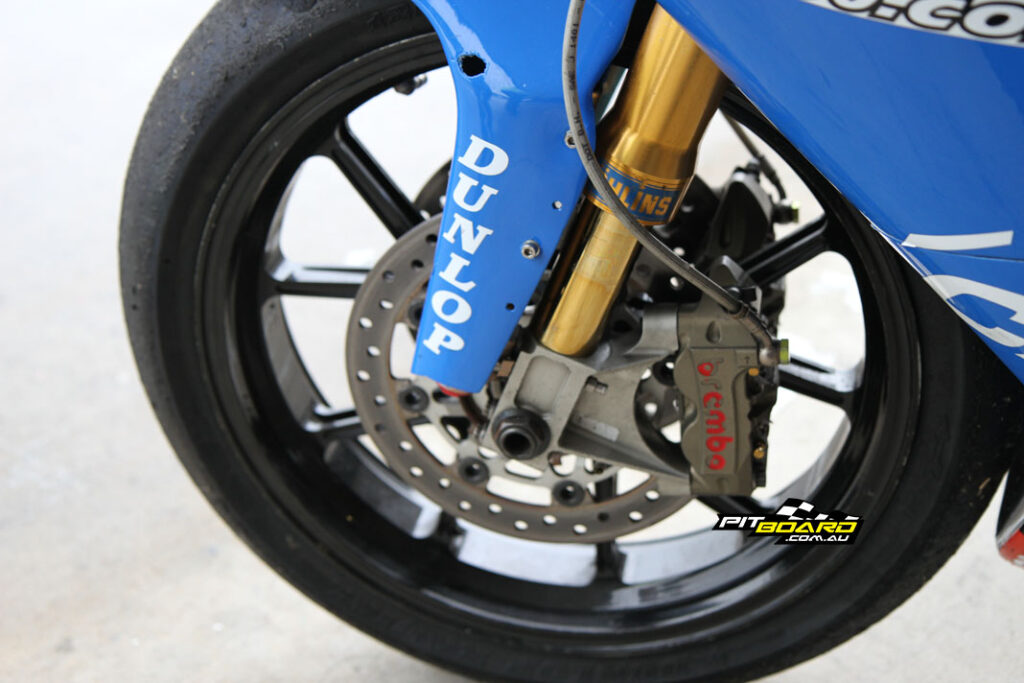
The datalogger system, which is the factory Aprilia one that came with a staff member for the teams, provides all aspects of data from braking to suspension and ignition and jetting. The software tells the team what jetting to change after each session, based on the live atmospheric conditions and data from the previous run.
The traction control system is an ignition curve based one that uses an algorithm to determine rear wheel slip based on throttle position, wheel speed, gear and so forth, similar to what is now used in modern motocross and enduro two-stroke factory race bikes.
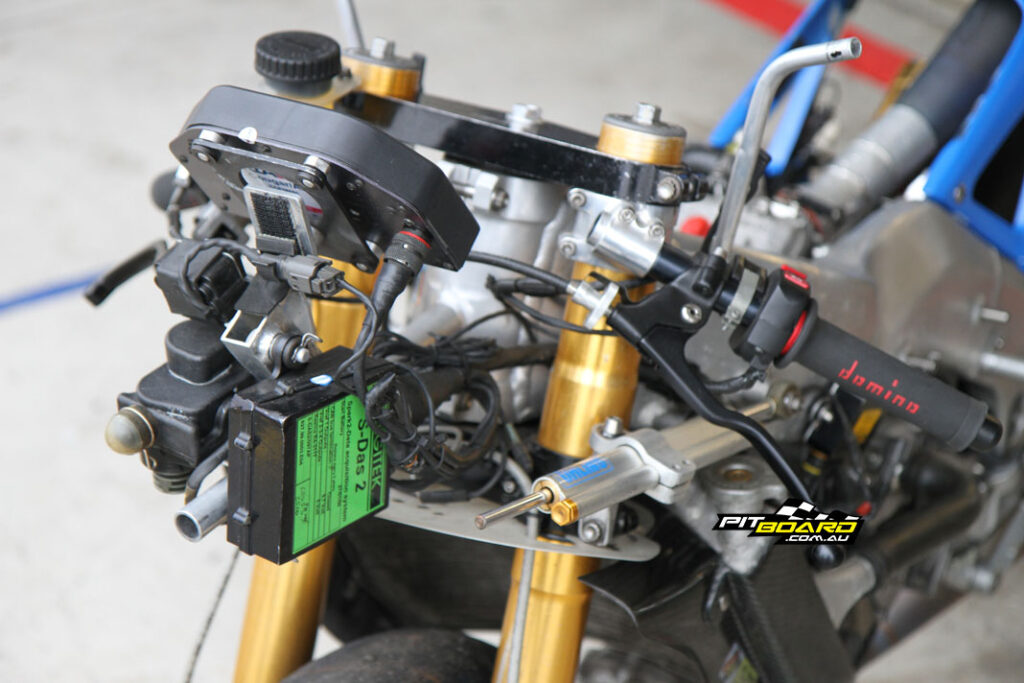
Everything on the RSW is hand-made and a work of art. From any angle, it looks amazing. Actually, I have blown up one of the photos we took and I have it as a poster above my workbench in my garage. This bike makes me feel young I guess… All of those dreams I had as a teenager about racing in 250…
THE RIDE
Nerves. Adrenaline. Excitement. Those three things that make you feel just a little bit sick in the stomach, well, they are all off the chart as Harry warms the bike up (see the video, it sounds so awesome).
I close my visor as he rolls the bike out into pit lane. If I’m riding a 250 GP bike, I’m walking out to it like a boss, visor down and cameraman snapping away! Ha!
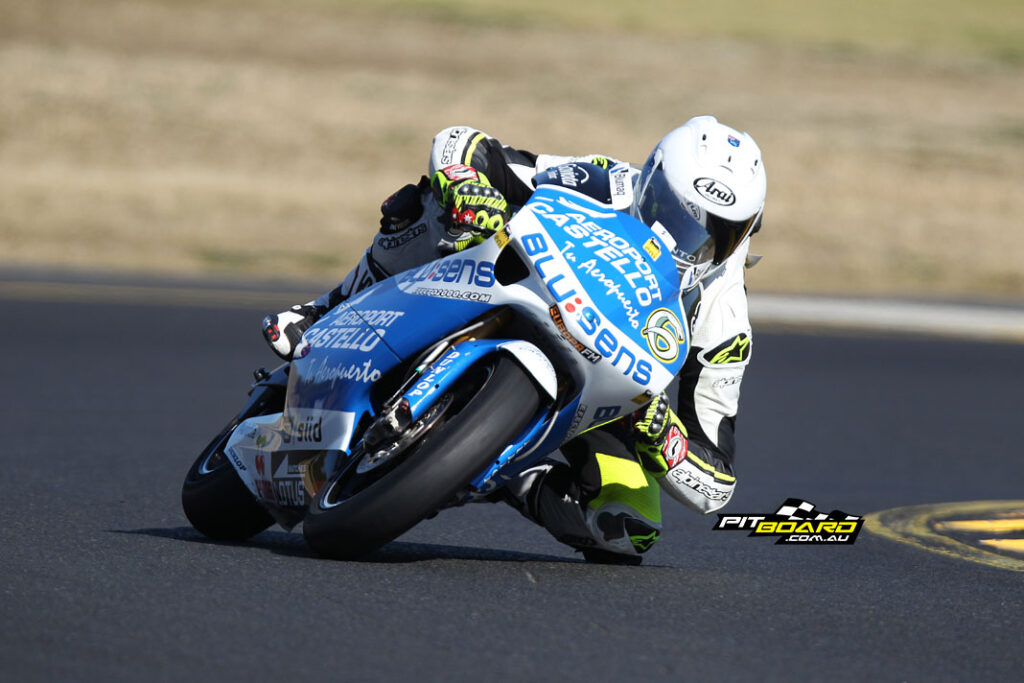
I hop on the bike and immediately think, ‘How the hell and I going to fit in this’… I think back to when I was 19 and skinny and I just squash myself into Laverty’s ergonomics. The nerves settle a little as I blip the throttle and get the engine up to temperature. My old two-stroke days are flooding back to me and there is a crowd gathering around the bike. It is loud. Very loud…
A huge amount of revs and clutch slipping, along with a lot of leg paddling and I’m off up pit lane. I just ride straight past the person checking wristbands, I’m not stopping again! I short-shift in the lower top-end via the ultra-slick factory quickshifter and do my usual checks into turn two, like feeling the front and rear brakes and generally getting into a relaxed riding position.
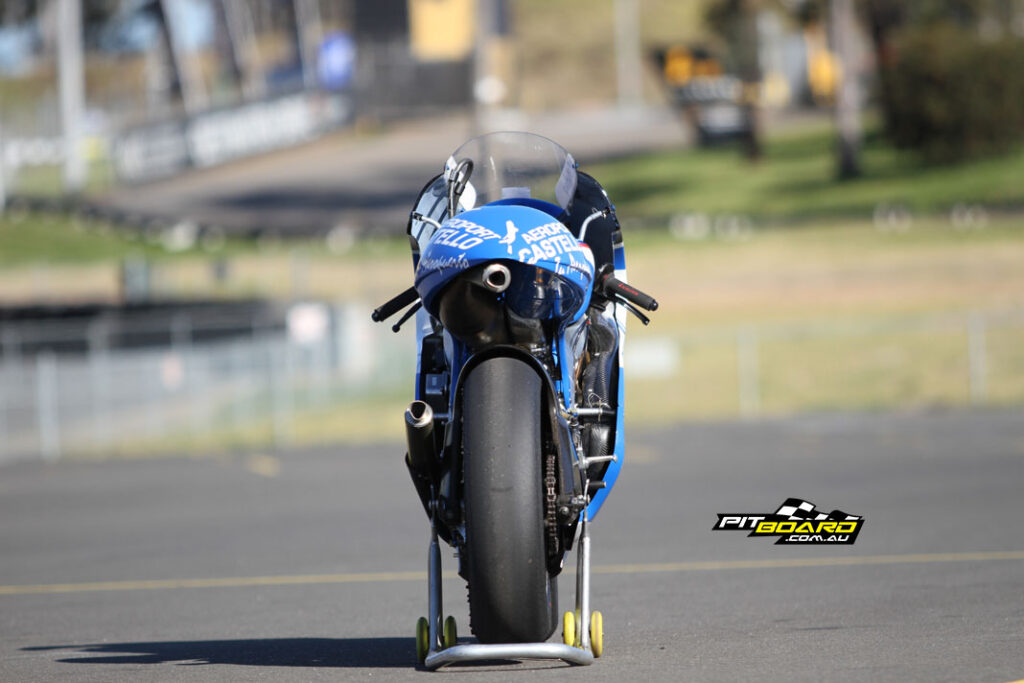
The bike was straight off the warmers and what blows me away is I’m scraping my whole leg in the second corner from pit lane and carrying more corner speed than I have on any bike for years, and it is my out lap! When you ride road production bikes for so long, it is easy to forget how a proper handling thoroughbred feels and there is no comparison to any street going bike at all, not even close. The RSW is beyond telepathic. It’s an extension of my body – more than a bike; well that is how it is making me feel.
Watching GP rider’s highside for a few decades is in the back of my mind exiting the turns on my out lap but I’m soon surprised at the amazing tractability and drive of the RSW. It is jetted a little on the conservative side, so hasn’t got that razor’s-edge sharpness to the throttle, but still it is on song and almost four-stroke like in some aspects. It pulls third where I would have expected second, or where a TZ250 or RS250 Honda would need a lower gear and or more RPM. Amazing stuff by Aprilia.
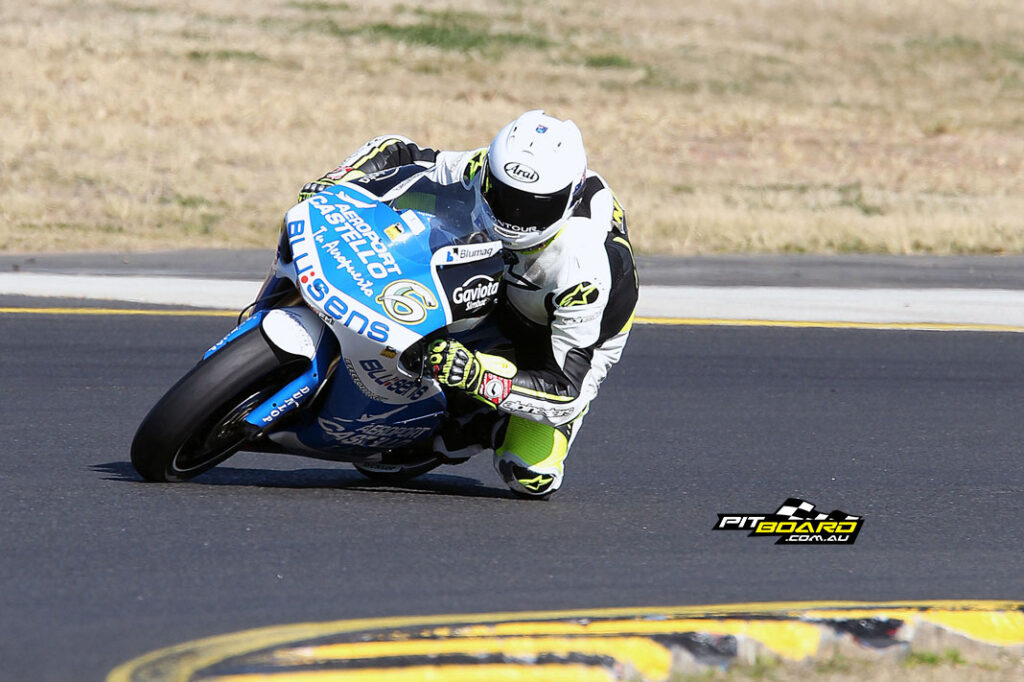
The gearbox is ultra-close-ration and the quickshifter super sensitive. The engine starts making power from as low as 8000rpm but really comes alive up top, where is pulls harder than most 1000cc bikes around while feeling like it is the weight of a bicycle. Steering is insane. At first I am oversteering and hitting inside ripple strips as I’m just too used to conservative geometry and weight.
But once my brain slows things down a bit I steer with a bit more finesse and find some rhythm there. The same goes for the brakes, one finger and even then I almost go over on the first lap. They are as strong as the best street sport bike, say an S 1000 RR or Panigale, but then double the power and sensitivity and imagine the bike also weighed a third as much, that will give you an idea. Comparing the RSW brakes to an RSV4, say, is like comparing RSV4 brakes to a 1972 RD250…
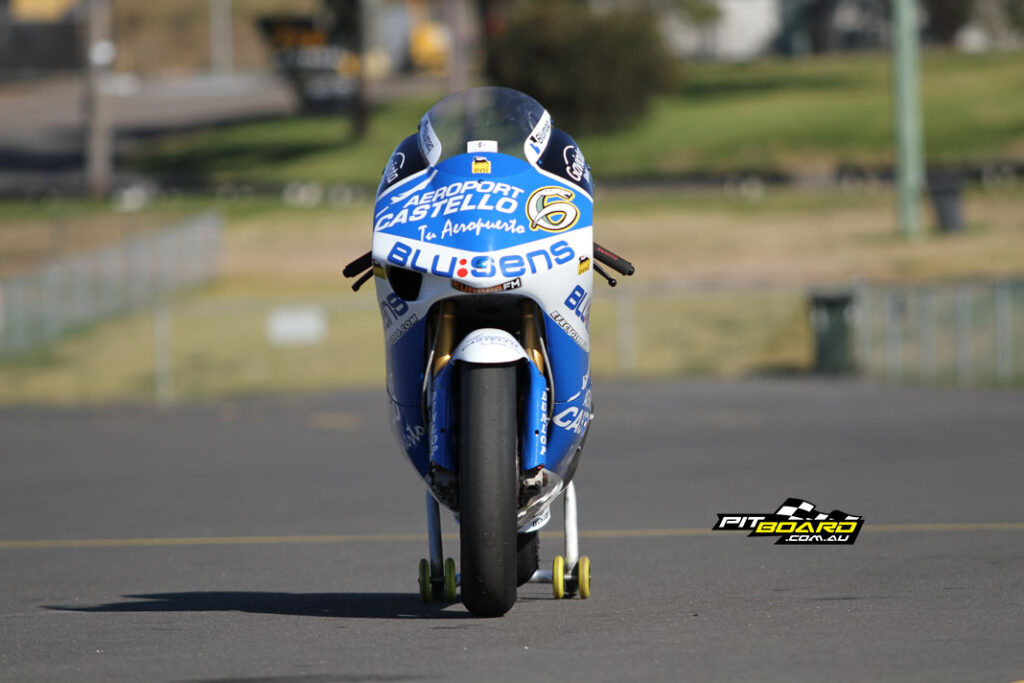
I settle down and start my session proper. Tucking in on the front chute I’m chasing gears as the engine revs so quickly it is incredible. The straight disappears faster than usual and suddenly I’m into the ultra fast turn one. I touch the brakes gently with one finger and pop it down to fourth gear. Getting back on the gas, I cannot believe how rapidly the 250 accelerate towards turn two.
In fact I have to grab fifth gear. I’m in shock and arrive at my usual braking point for T2 faster than I would on any superbike. I ride straight past my braking point, in fact still on the gas, and don’t start braking until I’m turning in. It is no problem; the RSW just goes deep, stays tight and hold a perfect line through the double-apex corner. I feel like I can put the bike anywhere, anytime.
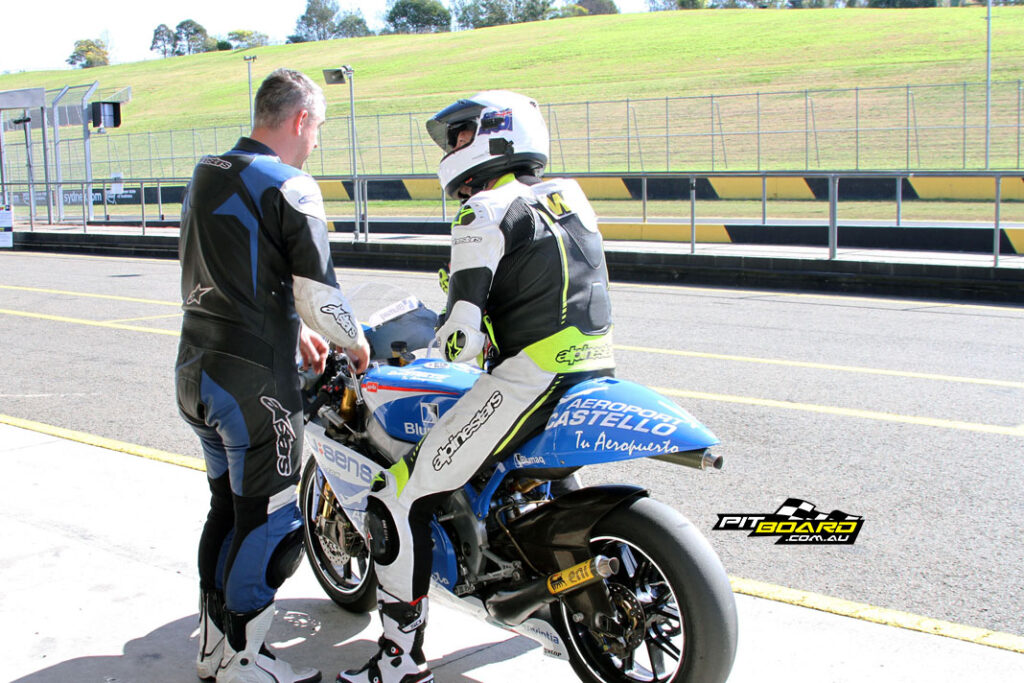
Getting the rpm right is not as crucial as it is on a TZ or RS, so although high corner speed and high rpm are still definitely required, there is some forgiveness there for a lard-ass like me who doesn’t get it inch perfect every lap. The bike hauls out of turn two, over three and is on the back wheel cresting the hump into turn four.
Having watched Biaggi and Co on video replay thousands of times here from the 1994 and 1995 races, I actually have one of those dream moments where I feel like they must have felt. It is surreal. I guess it is like a person with a passion for music suddenly finding themselves playing a stadium!
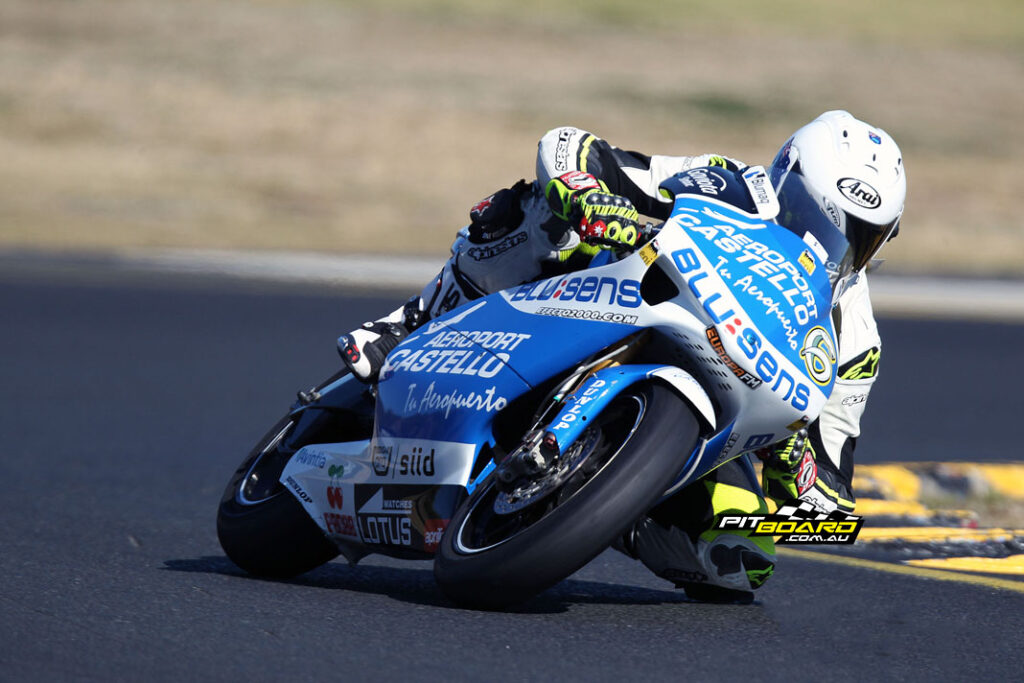
Up the hill out of five, with the engine in the sweet spot, the bike pulls with amazing urgency up this steep hill and again does the same to Corporate Hill, another bumpy long left-hand crest. Braking into the turn nine hairpin, I feel like my hands are holding the front axle! I’m waiting for Biaggi, Waldman, Capirossi or Harada to dive up the inside!
My lap ends and I’m in. Rolling into pit lane, after watching so many legend 250 riders at Aussie GP’s ride down this entrance, I feel like the luckiest man alive. That’s one dream ticked off the bucket list…
PRO RIDE – PETER GALVIN RIDES THE RSW250
Seven-times Australian 125 GP Champion and ex World 125 GP rider
At first I thought Jeff’s message was just a joke. We had a factory 250 Aprilia from former GP rider Eugene Laverty to test at Eastern Creek. Let me think about that for a micro-second. I’m there! Thanks to the generosity of the owner we had a few sessions at Sydney Motorsports Park. To say I was excited was an understatement. One look at it and I couldn’t wait to get on it.
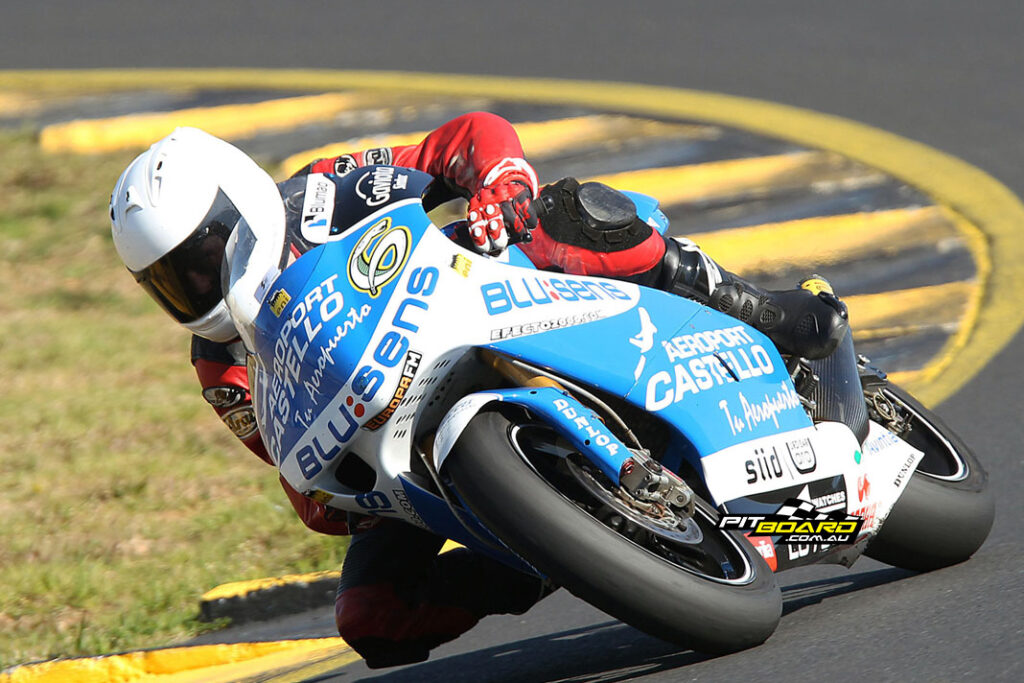
As soon as you hop aboard you know Aprilia has done their homework. The attention to detail and craftsmanship is, as you would expect, world class. Ergonomics were like a hand in a good fitting glove. No adjustments required. We fired up the 250 and warmed it up to operating temperature on the stand. The engine felt smooth and responsive if not a bit rich, which was OK for the day.
The first lap out, the most notable thing was the chassis feel. All my preconceptions had to go out the window as I was expecting a very stiff chassis like the 125. However, I am greeted with a firm but still flexible chassis with excellent feel just like the Honda 250 GP bike. This was a bit of a surprise in a good way. Having ridden Honda most of my career it made me feel right at home and immediately comfortable.
The chassis was only the start of the good times. The V-twin engine was just special. With strong torque off the slow and mid speed corners it was surprising how early you could get on the gas off the turns even with lower than optimum rpm.
It was far more forgiving than the 125, that’s for sure, even if I failed to keep the engine operating at the top end of the rev range. And, I have no doubt we could have improved this even further if we have had more time to finely tune the carburetion settings.
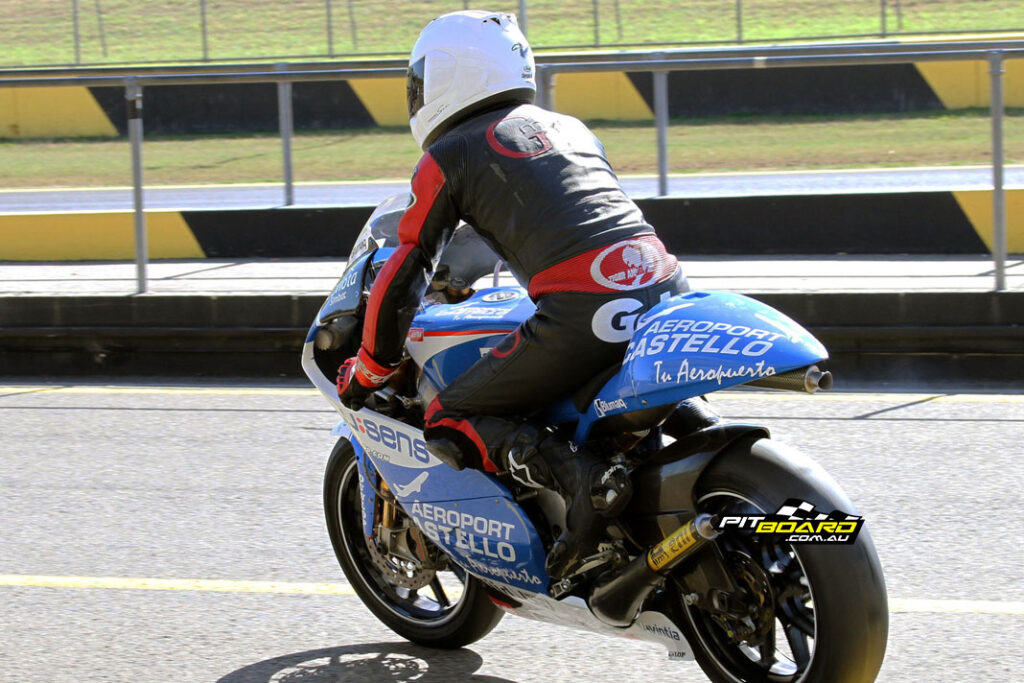
The Aprilia’s ability to pull strongly up hills between Turns 5 and 6 and 6 and 7 was another one of its strong points. Coming off Turn 5 was important for a good run up the hill and together with the resurface, great suspension and a bit of confidence it would pull like a train and was quite exhilarating when you got it right.
With the modification of Turn 6 after the track was extended the entry speed into Turn 6 has increased allowing a higher gear to be maintained making a nice connection through to the high speed Turn 7 left hander around Corporate Hill. As usual a bit bumpy there on the inside of the turn but soaked up nicely by the factory suspension, which leads to the next point.
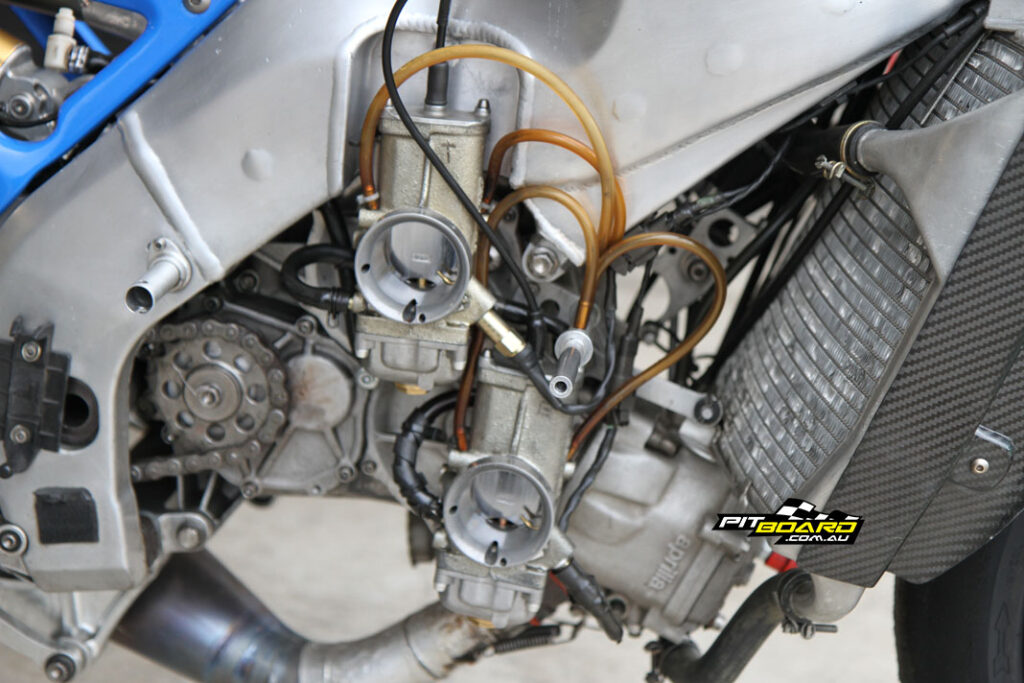
Fitted with factory Ohlins suspension front and rear and with little set-up it also was a good compliment to a strong all round package. If anything the rear suspension felt a bit firm for my weight particularly in the high speed corners, which in turn led to a slight lack of confidence to keep the throttle wide open when required. Again it was only a set-up issue and more time on the motorcycle would sort those minor issues out.
On slow and mid speed turns the suspension was so good I had trouble finding the limit initially and still had problems at the end of the sessions. Pushing it further each lap it was very surprising just how hard you could go. The fresh tyres certainly didn’t hurt either.
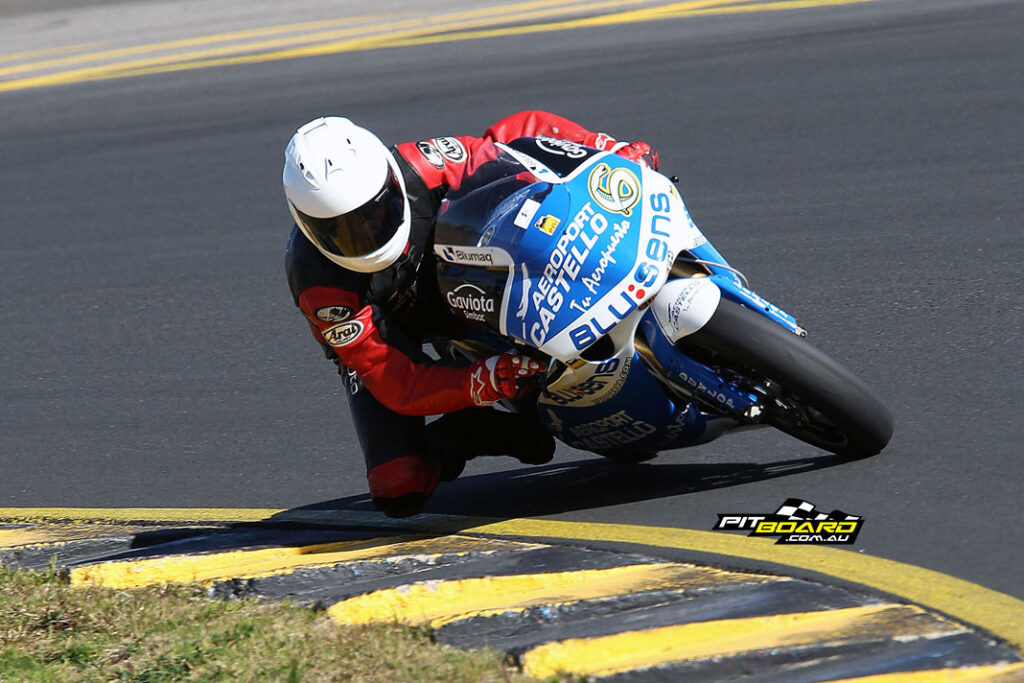
The other major strong point was the brakes. As expected we were blessed with the almost ubiquitous Brembo mono-block callipers as fitted to a large proportion of racing motorcycles worldwide. This was another area where you had to redefine your limits.
With such a lightweight motorcycle and such powerful brakes you had to rethink your braking markers each lap. I used the entry to Turn 2 to keep pushing the boundaries. Each lap I found myself braking deeper and deeper with almost no rear brake at all and the motorcycle remained stable and predictable at all times.
While all these components were first class it’s the blending of the parts to produce a sound workable motorcycle that really makes the Aprilia RSW250 stand out. Bringing all this together has built a fast yet highly agile motorcycle that is fun and very exciting to ride.
Yes, you have to concentrate and keep the engine working within a relatively narrow rev range to obtain maximum performance but I think that is a large part of the challenge and satisfaction from getting it right.
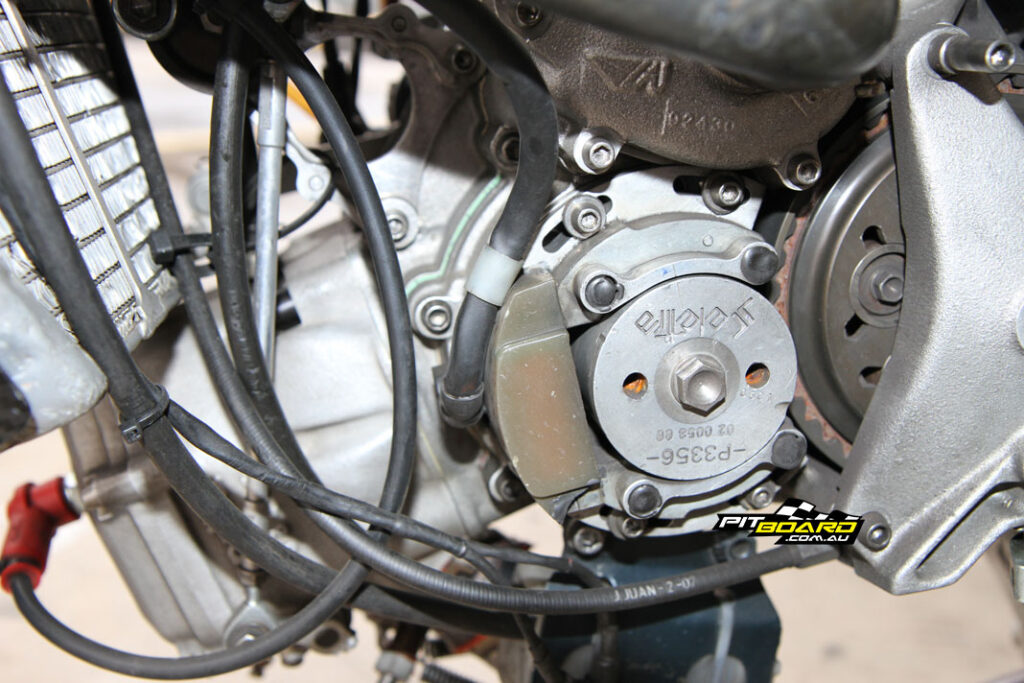
With high hopes prior to riding this motorcycle, my expectations were exceeded. One of the greatest benefits of this Aprilia RSW250 is its high power to weight ratio and relatively simple engine configuration. In its finest form it illustrates perfectly what a basic two-stroke engine can achieve.
There is no doubt this is one of the best motorcycles I have had the opportunity to ride. I would love the chance to set up the suspension and carburetion to better understand its full potential. As a fan of two-strokes, it was a sad day when they were no longer eligible for Grand Prix racing as I believe they produced some of the best racing to be seen during the 1980s and 1990s plus early 2000s.
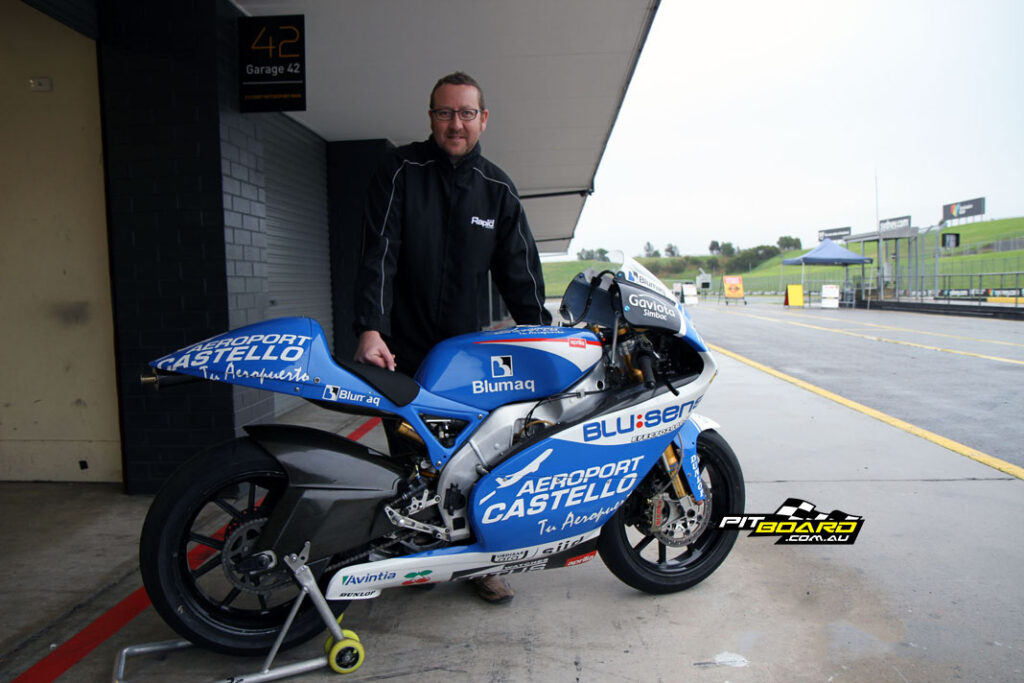 2007 APRILIA RSW250 SPECIFICATIONS
2007 APRILIA RSW250 SPECIFICATIONS
Price: Around five new RSV4s
Power: 110hp – 110hp@13,000rpm
Wet weight: 200lbs
Engine: 249cc 90-degree V-twin two-stroke, full data logging, digital ignition, traction control
Bore & stroke: 54 x 54.5mm
Displacement: 249cc
Compression: 12.0:1
Fuel delivery: 42mm flat slide VHSE magnesium carburetors
Exhaust: DLR carbon-fibre mufflers and Aprilia Racing titanium expansion chambers
Gearbox: Cassette-style adjustable ratios
Clutch: Dry
Final drive: Chain
Chassis: Aluminium, hand made
Wheelbase: Variable
Rake & trail: Variable
Suspension: Front: Factory Ohlins; Rear: Factory Ohlins
Brakes: Front: Brembo
Wheels: Carbon-fibre
Tyres: Racing slicks



